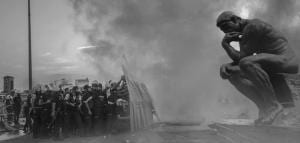 The notion of “human rights,” despite its omnipresence in modern political discourse, is not a concept that traditionally finds favor with philosophical conservatives. After all, Alasdair MacIntyre’s After Virtue delivered a scathing critique of the doctrine, attacking its apparent indeterminacy and its seeming capacity to encompass any privilege-claims an individual might assert. On MacIntyre’s framing, the language of “human rights” routinely serves as a proxy for purely emotivist moral claims—that is, claims that amount more to assertions of personal preference than statements about the nature of objective reality. And in a world where the United Nations allows Saudi Arabia, China, and Iran to sit on its “Human Rights Council,” is MacIntyre’s argument really that far off the mark? Why can’t we all be supporters of “human rights” if we say we are?
The notion of “human rights,” despite its omnipresence in modern political discourse, is not a concept that traditionally finds favor with philosophical conservatives. After all, Alasdair MacIntyre’s After Virtue delivered a scathing critique of the doctrine, attacking its apparent indeterminacy and its seeming capacity to encompass any privilege-claims an individual might assert. On MacIntyre’s framing, the language of “human rights” routinely serves as a proxy for purely emotivist moral claims—that is, claims that amount more to assertions of personal preference than statements about the nature of objective reality. And in a world where the United Nations allows Saudi Arabia, China, and Iran to sit on its “Human Rights Council,” is MacIntyre’s argument really that far off the mark? Why can’t we all be supporters of “human rights” if we say we are?
This is precisely the issue that longtime human rights activist Aaron Rhodes sets out to address in his thought-provoking book The Debasement of Human Rights: How Politics Sabotage the Ideal of Freedom. At bottom, Rhodes draws a sharp distinction between civil and political human rights (freedom from coercion, or what have been traditionally called negative rights) and economic, social, and cultural rights (rights traditionally secured through the political process, or positive rights). What Rhodes identifies as the “debasement of human rights” is the placement of these two conceptions of human rights on an equal footing—such that Turkmenistan or Zimbabwe can claim to be defending “human rights” (in the sense of social or cultural rights—that is, dominant group cohesion) while simultaneously denying their citizens traditional political liberties.
This philosophical muddle, Rhodes argues, lies at the root of the UN’s general moral irrelevance: where every nation can assert some claim to be a “defender of human rights,” there is no intelligible basis for calling out genuine totalitarianism. And it is a muddle that goes all the way back to 1948’s Universal Declaration of Human Rights, the ur-text for human rights advocacy in the modern age. (Leading Catholic intellectual Jacques Maritain comes in for fierce criticism here for his “pragmatic” approach to human rights—one that eschewed serious philosophical inquiry in favor of superficial textual consensus.)
Though the point is developed perhaps less comprehensively than one might like, Rhodes—I believe correctly—roots his concept of civil and political rights in natural law, while treating economic, social, and cultural rights as issues of positive law. That is to say, substantive economic and social outcomes—how large of a Gini coefficient is appropriate?—are prudential judgments, rather than directly derivative of the natural law.
The logic of Rhodes’s stance is grounded in the endlessly fruitful study of human nature. For example, the freedom to participate in the political process is, at bottom, the freedom to fully live into one’s essential, God-given nature as a dependent rational animal. So too, the freedoms of religion and speech are freedoms to seek the one true Good (as far as we know, a distinctly human endeavor) and to exercise one’s creative capacities as the image and product of that Good. These are freedoms that monks and nuns—despite having taken vows of poverty, chastity, and obedience—may exercise even while in a state of segregation from human society and under the discipline of a monastic Rule. And there is a great deal of daylight between these concepts and, for instance, a supposed human right to be free of noise pollution—a howler Rhodes flags, but that the European Court of Human Rights has nevertheless recognized. Some rights are contingent on nothing but human nature; others are closely bound up with particular historical circumstances and material conditions. This, according to Rhodes, is the determinant of legitimacy for any “rights-claim.” (Unfortunately, Rhodes’s book does not engage with scholarship such as Samuel Moyn’s Human Rights and the Uses of History, which memorably suggests that more theoretical attention should be paid to the duties that a government owes its people.)
Notably, Rhodes understands himself as working within the broadly liberal tradition. And this is, in part, why I’m not sure it makes sense to treat “liberalism” as an undifferentiated conceptual monad—in the vein of Patrick Deneen and those who’ve followed in his wake (including many of the integralists). The force of Deneen’s critique is rooted in its observation that, where the two great “liberal” values of liberty and equality are affirmed, a culture will inevitably slew towards the latter value, growing totalitarian while still paying lip service to the former value (isn’t a certain level of material well-being the “precondition” of the exercise of liberty?) But on Rhodes’s account, the material-equality value is—quite simply—never paramount. The prioritization of that value, according to Rhodes, is the original sin of the modern order, and one that has rendered impotent any arguments from natural law.
In light of careful arguments like Rhodes’s, it seems to me that liberalism’s critics really ought to articulate a more fine-grained account of what exactly it is that they reject in the contemporary order. Their target, properly understood, is perhaps better characterized as the bland “neoliberalism” of the elite caste—rather than a thoroughgoing libertarianism that does not subordinate itself to the goal of material equality. Only the former regime (which claims to hold liberty and equality in perfect harmony) possesses the self-destructive “inner logic” that leads to illiberalism, if one assumes the correctness of Deneen’s account.
Now, that’s not to say that libertarianism qua libertarianism shouldn’t be rigorously interrogated: does a largely deregulated economic order genuinely lead to human well-being en masse? To my mind, a meaningful postliberalism is one that probes questions of human flourishing in a society where the phenomenon of material scarcity—the scarcity that impels capitalist practice—is less and less a forgone conclusion. This, however, is a debate that few of liberalism’s contemporary conservative critics have chosen to engage, perhaps because it resists easy conclusions. How does a political regime properly exercise authority over human beings who are diverse in their activities and their responses to God’s eternal creative act? What are the boundaries of creativity, such that individual ingenuity promotes human flourishing rather than flattering human degeneracy?
Future posts, to be sure, will take up these and related questions.












